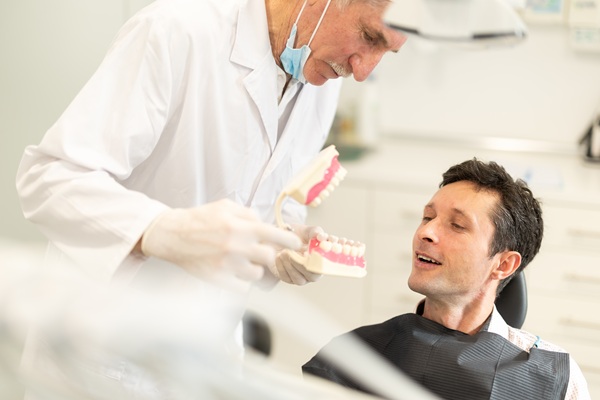Family Dentist FAQ: How Dangerous is a Cavity?

Family dentists are certified general dentists who specialize in treating patients of all ages, including children and adults. Because family dentists focus their efforts on general dentistry care, they are often tasked with diagnosing and treating cavities. Cavities are known to be infections in the teeth, which can result in long-term damage if the appropriate care is not given.
Can cavities be dangerous?
One concern many dental patients have is whether or not a cavity can be dangerous to their oral health. Because cavities can cause tooth decay and loss, they are extremely dangerous. Cavities are a form of tooth decay, which starts out as an infection. According to the American Dental Association, tooth decay is the destruction of a tooth’s enamel, which is the hard, outer layer of a tooth. Once this decay is able to enter a tooth, it means the tooth is no longer protected from harmful outside elements.
Oftentimes, the lack of protection results in serious damage to the tooth, surrounding soft tissues and the entire oral cavity. It is also important to understand that cavities can potentially cause someone to be diagnosed with any number of serious general health problems. This is due to the fact that tooth infections can spread throughout the body, even affecting the brain and the heart. To conclude, cavities that go ignored can result in tooth loss, as well as irreversible damage to the entire body.
Cavity treatment
While root canal therapy is a common type of treatment for cavities that have entered the pulp of a tooth in order to address the infection, this treatment is reserved for more severe cavities that have affected the entire tooth, pulp included. When cavities are caught in their earlier stages, patients can undergo simpler dental treatment options. For example, smaller cavities can often be treated using a dental filling after the family dentist has removed all of the decay. Moderate cavities will also need all of the decay removed and then the tooth can be restored using either onlays or dental crowns, both of which are popular restoration options that a family dentist recommends.
In order to prevent cavities from forming in the first place, dental patients need to create a proper oral hygiene care routine. This includes brushing at least twice a day, flossing at least once a day and making regular dental check-up appointments with a family dentist, which will include exams and cleanings. Choosing to eat a healthy diet that includes plenty of fiber also helps lower the chances of a dental patient being diagnosed with one or more cavities in their mouth.
Find out more about cavities
Cavities should never go ignored. Long-term, they can result in serious damage to the oral cavity and the entire body. Because of the potential risks, it is necessary to regularly see a family dentist for prevention and management. To learn more about cavities and the role a family dentist plays, reach out today.
Are you considering using a family dentist in the Huntsville area? Get more information at https://www.yourhuntsvilledentist.com.
Check out what others are saying about our services on Yelp: Read our Yelp reviews.
Recent Posts
Choosing the best dentist is essential for maintaining your oral health. However, finding the right dentist for you can feel overwhelming with so many options available. Fortunately, by considering a few key factors and gathering some key information, you can identify a trustworthy dental professional who meets your needs.Convenience plays a significant role in choosing…
Endodontics treatment, which is the treatment of the tooth's inner pulp and structures, is one of the most efficient ways to save decaying or damaged teeth. Many individuals, however, get anxious when they learn they need it. This is mostly due to the widespread misconception that undergoing endodontic treatment is unpleasant. It is incorrect —…
Patients often search for root canal treatment when a tooth aches from deep decay, a crack, or inflamed pulp tissue. This therapy removes irritated nerve tissue, disinfects the canal space, and seals the tooth to prevent reinfection. By preserving the natural root, the procedure maintains bite balance and chewing strength. With careful planning, a restored…
Looking for information on periodontic care? Continue reading to learn about situations when a dentist might recommend periodontics. Periodontal disease, commonly known as gum disease, is a serious oral health issue that can result in severe oral infections and tooth loss. Periodontal disease may be contained and handled with the appropriate professional treatment.Gum disease can…


